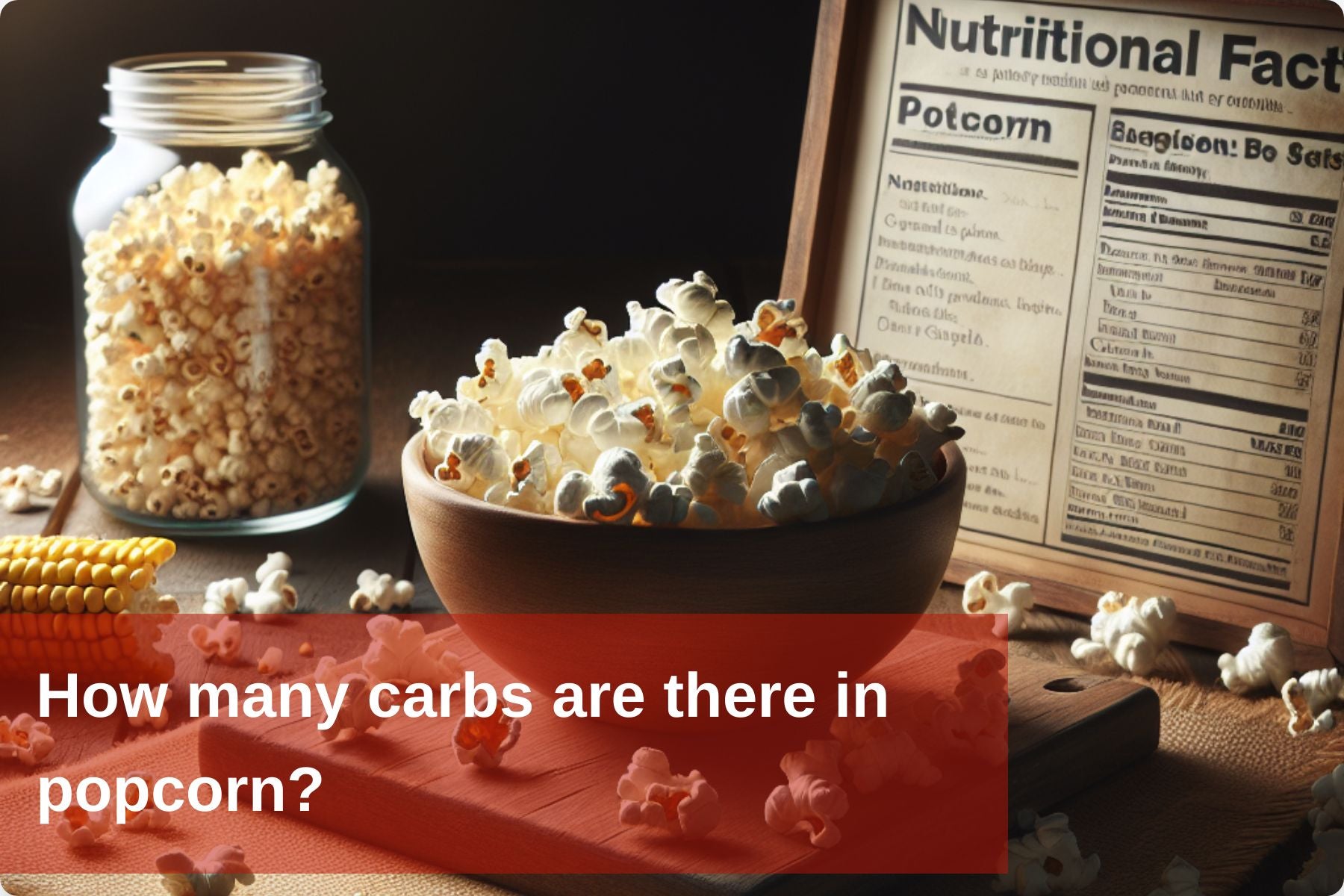
How many carbs are there in popcorn?
Popcorn has earned its reputation as a beloved snack, satisfying our cravings during movie nights or as a quick treat. Its light and airy nature, coupled with the joy of hearing it pop, make it an irresistible choice for many. In this exploration, we explore a specific aspect that's often overlooked – the carbohydrate content in popcorn.
While we savor the taste and enjoy the unique experience of popping corn, understanding the nutritional components becomes crucial for those mindful of their diet. Carbohydrates play a significant role in our daily intake, and popcorn, despite its seemingly simple nature, has its own contribution to this aspect of nutrition. So, let's embark on this journey to uncover the carbohydrate mysteries hidden within those popped kernels.

What Makes Up Popcorn?
Kernel |
The hard outer shell that contains the starch and moisture necessary for popping. |
Starch |
Inside the kernel, which expands and becomes fluffy when heated. |
Moisture |
Small amount of water inside the kernel that turns to steam and causes it to pop. |
Fiber |
Provides a source of dietary fiber. |
Carbohydrates |
Mainly from the starch content. |
Proteins |
Small amounts of protein are present. |
Fat |
Very low in fat unless added during preparation (e.g., butter, oil). |
Nutrients |
Contains small amounts of vitamins and minerals like B vitamins, magnesium, and zinc. |
Carbs in Popcorn: A Nutritional Breakdown
Type of Popcorn |
Serving Size |
Calories |
Total Carbs (g) |
Fiber (g) |
Net Carbs (g) |
Protein (g) |
Fat (g) |
|---|---|---|---|---|---|---|---|
Air-Popped Popcorn |
1 cup |
31 |
6.2 |
1.2 |
5.0 |
1.0 |
0.4 |
Oil-Popped Popcorn |
1 cup |
55 |
6.3 |
1.1 |
5.2 |
1.0 |
3.0 |
Microwave Popcorn |
1 cup |
64 |
8.0 |
1.2 |
6.8 |
1.0 |
4.5 |
Caramel Popcorn |
1 cup |
150 |
22.0 |
1.0 |
21.0 |
1.0 |
7.0 |
Cheddar Cheese Popcorn |
1 cup |
70 |
5.0 |
1.0 |
4.0 |
1.0 |
5.0 |
Kettle Corn |
1 cup |
58 |
12.0 |
1.0 |
11.0 |
1.0 |
2.0 |
Popcorn at home made easy
Ingredients
1/4 cup popcorn kernels
2 tablespoons oil (vegetable, canola, or coconut)
Salt to taste
Steps
-
Heat the Oil:
Pour the oil into the large pot and place it on medium heat.
Add a few popcorn kernels to the oil and cover the pot.
-
Test for Heat:
Wait until the test kernels pop. This indicates that the oil is hot enough.
Remove the test kernels from the pot.
-
Add the Kernels:
Add the rest of the popcorn kernels to the pot.
Cover the pot with the lid.
-
Pop the Corn:
Gently shake the pot occasionally to prevent the kernels from burning.
Listen for the popping sounds. When the popping slows down to a few seconds between pops, remove the pot from the heat.
-
Season and Serve:
Carefully remove the lid (watch out for steam).
Pour the popcorn into a large bowl.
Season with salt or your favorite toppings and mix well.
-
Enjoy:
Serve immediately and enjoy your homemade popcorn!

Popcorn Carbs: How Much is in Your Snack?
Popcorn, primarily composed of complex carbohydrates like starch and featuring a respectable fiber content, stands as a relatively wholesome snack choice. The nutritional breakdown reveals a balance that provides sustained energy – a stark contrast to the empty carbs often found in other popular snacks.
As we consider potential health implications, it's essential to recognize that moderation is key. While popcorn brings valuable nutrients to the table, excessive consumption, especially of heavily buttered or flavored varieties, may introduce unwanted elements into your diet. However, the versatility of popcorn allows for various preparation methods, enabling you to tailor your snack to align with your health goals.
For those aiming to maintain a balanced diet, incorporating popcorn can be a smart move. Its satiating nature, coupled with its fiber content, can help curb hunger between meals. Opting for air-popped or lightly seasoned popcorn adds to its nutritional appeal without compromising on flavor.
Popcorn isn't just a guilty pleasure; it's a snack that can be part of a well-rounded, health-conscious diet. So, the next time you reach for those popped kernels, savor the flavor and enjoy the satisfaction of choosing a snack that aligns with both your taste buds and your health goals.
FAQs
-
Is popcorn high in carbs?
Popcorn is relatively high in carbs compared to other snacks, as it is primarily a whole grain. One cup of air-popped popcorn contains about 6 grams of carbs.
-
What type of popcorn has the lowest carb content?
Plain air-popped popcorn without any added butter or flavors has the lowest carb content compared to flavored or microwave popcorn varieties.
-
Are there low-carb alternatives to traditional popcorn?
Yes, there are low-carb popcorn alternatives available, such as cauliflower popcorn or cheese popcorn made with low-carb cheese.
This Blog post is an initiative by Lo! Foods, to provide accurate and Nutritionist / Doctor approved information related to Health. Lo! Foods is India's leading brand for Everyday Functional Foods. Foods designed for specific Health conditions or Needs. Lo! Foods also runs India's largest range of Low Carb Healthy Cloud Kitchens, under the brand names of Lo!, ProteinChef, ATH (All Things Healthy) and DiabeSmart.













Leave a comment
Your email address will not be published.